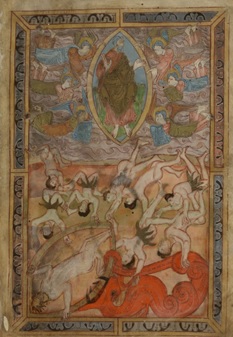Old Engli.sh
The Portal to the Language of the Anglo-Saxons
Read another, randomly chosen, past Old-Engli.sh News article:
Lo! Dictionary of Old English unveils lovely Old English Words in L
February 2023
June 2018
A Fruitful Year for Old English: The Dictionary of Old English Progress Report 2017
The Dictionary of Old English presents its report for 2017 - an exceptionally eventful year as the team welcomes their new Chief Editor, completes the letter I, and maximizes efforts with outreach and dissemination. |  A depiction of Hell from an Anglo-Saxon Manuscript Cotton Claudius B.IV |
The Dictionary of Old English (DOE) had a fruitful year in 2017. First, the DOE celebrated the arrival of their new Chief Editor, Professor Haruko Momma, who now holds the Cameron Professorship of Old English Language and Literature at the University of Toronto. Professor Momma was previously a research assistant at the project during her time as a graduate student at the University of Toronto, and hence brings great expertise and familiarity with the inner workings of the DOE.
Secondly, preparations to publish the letter I are approaching completion. The publication will include approximately 450 distinct headwords, including several particularly challenging lemmas such as the multi-faceted word in. The letter I is expected to be ready for publication by the second half of 2018. With work on I almost complete, the editors are already drafting several entries for the letter L. This installment of the dictionary will see, among others, detailed descriptions of Old English words involving lang ‘long’ and laece ‘physician’.
Finally, 2017 saw some outstanding efforts in outreach and dissemination. Professor Momma gave an update on the DOE’s progress to the Old English Executive Committee at the Modern Language Association (MLA) conference in Philadelphia. She also attended the biannual Advisory Board meeting of the International Society of Anglo-Saxonists at Hawaii, a conference in Munich held in honor of Professor Helmut Gneuss, entitled Anglo-Saxon Micro-texts, and the University of Notre Dame’s workshop Current Trends in Anglo-Saxon Studies. Other members of the project were actively involved in dissemination as well. Furthermore, the DOE sponsored the seminar Medieval Language Studies in Germany Today to strengthen cooperation between the team and fellow German lexicographers, was involved in the STEP Forward project, an initiative to familiarize undergraduate students with digitization for research in the humanities, and held a special session at the annual meeting of the Medieval Academy in honor of their former Chief Editor, Tony Healey. Lastly, the project released a YouTube video introducing their drafting editors Robert Getz and Stephen Pelle.
2017 was a prolific year for DOE, and we can all look forward to witnessing more groundbreaking lexicographical enterprises in the future.
Secondly, preparations to publish the letter I are approaching completion. The publication will include approximately 450 distinct headwords, including several particularly challenging lemmas such as the multi-faceted word in. The letter I is expected to be ready for publication by the second half of 2018. With work on I almost complete, the editors are already drafting several entries for the letter L. This installment of the dictionary will see, among others, detailed descriptions of Old English words involving lang ‘long’ and laece ‘physician’.
Finally, 2017 saw some outstanding efforts in outreach and dissemination. Professor Momma gave an update on the DOE’s progress to the Old English Executive Committee at the Modern Language Association (MLA) conference in Philadelphia. She also attended the biannual Advisory Board meeting of the International Society of Anglo-Saxonists at Hawaii, a conference in Munich held in honor of Professor Helmut Gneuss, entitled Anglo-Saxon Micro-texts, and the University of Notre Dame’s workshop Current Trends in Anglo-Saxon Studies. Other members of the project were actively involved in dissemination as well. Furthermore, the DOE sponsored the seminar Medieval Language Studies in Germany Today to strengthen cooperation between the team and fellow German lexicographers, was involved in the STEP Forward project, an initiative to familiarize undergraduate students with digitization for research in the humanities, and held a special session at the annual meeting of the Medieval Academy in honor of their former Chief Editor, Tony Healey. Lastly, the project released a YouTube video introducing their drafting editors Robert Getz and Stephen Pelle.
2017 was a prolific year for DOE, and we can all look forward to witnessing more groundbreaking lexicographical enterprises in the future.
- Download the Dictionary of Old English 2017 Progress Report